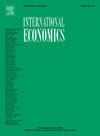石油冲击与伊斯兰金融市场:量化因果关系方法的证据
引用次数: 0
摘要
本研究探讨了伊斯兰股票指数与石油冲击之间的非线性关系。非线性关系是从非参数因果关系的四分位棱镜中观察的,石油价格被分解为需求、供应和风险。本研究的目的是考察伊斯兰行业股票与石油冲击之间的因果关系。通过使用十个行业伊斯兰股票指数的数据集,我们发现相关变量之间的因果关系在以下方面存在差异:(i) 冲击措施(即需求、供应或风险);(ii) 行业类型(即十个行业);(iii) 市场状态(熊市、正常市场、牛市);(iv) 模型规格(均值方程与方差方程)。我们发现,在美国,行业回报、需求和风险冲击会影响工业、信息技术和 ESG 行业的所有量级,而供给冲击会导致正常市场条件下的变化。美国医疗保健行业仍然不敏感,通信行业仅在极端量化条件下受到影响。每次石油冲击都会对亚太地区和新兴伊斯兰市场产生显著的因果影响,而且在所有量级上都是如此。发达市场和欧洲伊斯兰市场对风险相关冲击依然敏感。本文讨论了这些结果对政策的影响。本文章由计算机程序翻译,如有差异,请以英文原文为准。
Oil shocks and the Islamic financial market: Evidence from a causality-in-quantile approach
This study examines the nonlinear relationship between Islamic stock indices and oil shocks. Nonlinearity is viewed from the prism of nonparametric causality-in-quantile, and oil price is decomposed into demand, supply, and risk. The objective of this study is to examine the causality between sectoral Islamic stocks and oil shocks. Using a dataset for ten sectoral Islamic stock indices, we show that causality between the variables of interest is heterogenous across (i) measures of shocks (i.e., demand, supply, or risk), (ii) types of the sector (i.e., the ten sectors), (iii) state of the market (bear, normal, bull) and (iv) model specifications (mean vs. variance equation). We find that for the US, sectoral returns, demand and risk shocks affect Industrial, Information Technology, and ESG sectors across all quantiles, while supply shocks cause changes across normal market conditions. The US healthcare sector remains insensitive and the communications sector is affected only across extreme quantiles. Each oil shock exhibits a significant causal effect on Asian Pacific and Emerging Islamic markets consistently across all quantiles. Developed and European Islamic markets remain sensitive to risk-related shocks. Policy implications of these results are discussed.
求助全文
通过发布文献求助,成功后即可免费获取论文全文。
去求助
来源期刊

International Economics
Economics, Econometrics and Finance-Economics, Econometrics and Finance (all)
CiteScore
6.30
自引率
0.00%
发文量
74
审稿时长
71 days
 求助内容:
求助内容: 应助结果提醒方式:
应助结果提醒方式:


